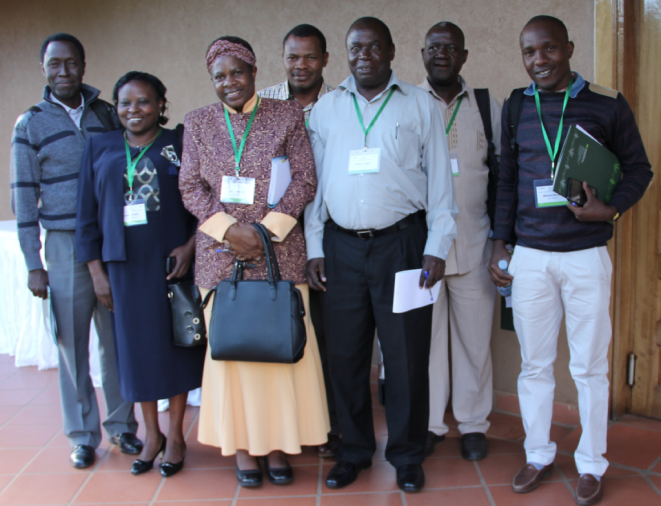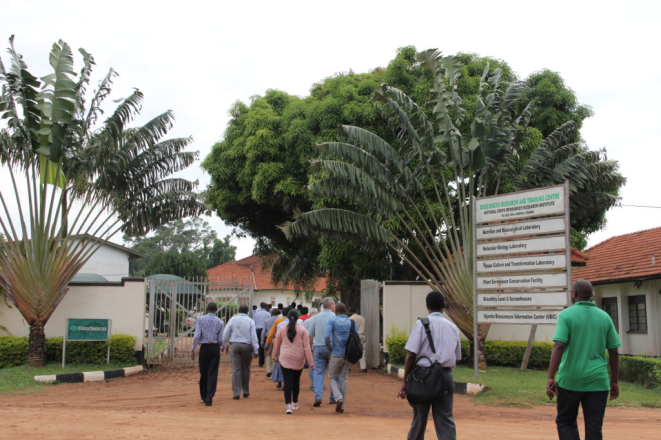"By working together, we can have much greater impact and help train breeders in the latest and most efficient techniques,” Liz Jones, GOBII Director.

This article first appeared on BTIScience.org
“We are at a pivotal point in time where there are several open-source data systems and analysis tools being built that can be utilized for developing country breeding programs. By working together, we can have much greater impact and help train breeders in the latest and most efficient techniques,” according to Liz Jones, Director of the Genomics and Open-source Breeding Informatics Initiative (GOBII) and member of the CGIAR Excellence in Breeding Platform (EiB) expert advisory group.
Jones’ words epitomize the theme of a recent GOBII/EiB-sponsored workshop held at the Speke Munyonyo Resort in Kampala, Uganda (November 8th-10th), with an additional day of field and lab tours at the National Crops Resources Research Institute (NaCRRI). Crop breeders, scientists, software developers and vendors alike united to take part in the three-day series entitled “Application of genotypic information in variety development: strategy and implementation.”
The workshop focused on providing overviews of breeding tools and technologies offered to African partners by GOBII and EiB..
Participants took part in informational presentations, break-out discussions, field visits, lab tours, and hands-on demonstrations. The meeting covered essential elements of breeding from barcoding plants to genomic data management.
“The workshop represented the first cross-initiative coordinated outreach activity of the newly formed Excellence in Breeding Platform,” according to Mike Olsen, Upstream Research Coordinator at the International Maize and Wheat Improvement Center (CIMMYT).
“It was an encouraging start to greater collaboration and capacity development of CGIAR and national program partner breeding teams.”
The GOBII project seeks to create the architecture for a publicly accessible genomics database and decision support tools to accelerate the development of improved crop varieties. By hosting workshops, GOBII is able to learn more about the needs of their users and provide direct support and training.

Participants took part in field visits and tours at the National Crops Resources Research Institute (NaCRRI).
“The workshop allowed us to better understand our international partners’ needs and constraints, many of which are highly eager to adopt and embrace the modern data management systems and tools we are offering,” said Star Gao, a GOBII breeding informatics and application specialist and one of the primary workshop planners.
“To fulfill and sustain our missions in transforming breeding in the under-resourced world, GOBII, as a global community, is committed to data management and application tools’ development, training, and users’ adoption and implementation tracking.”
“I am glad that our team had an opportunity to learn the new tools and seeing the versatility in them,” said Joyce Maliga, Food Crops Institute Director at the Kenya Agriculture and Livestock Research Organization (KALRO). “I will definitely work with our Director on future training plans and collaboration opportunities to incorporate GOBII and EiB breeding tools into our breeding program.”
In addition, the workshop had a more significant impact by allowing partners to interact and meet face-to-face. For Deb Weigand, a GOBII software quality assurance specialist, the workshop had a particularly impassioning effect.
“Being able to see the greater impact of our tools, visiting actual labs carrying out the hard science…that was the best part of the experience. Seeing how we all fit into the bigger picture was a great reminder of the value of everyone’s work. GOBII is part of a truly innovative, global community.”
Using feedback given after the workshop, GOBII plans to continue to coordinate and host regular meetings and additional workshops in 2018
Comments
These workshop means a lot to